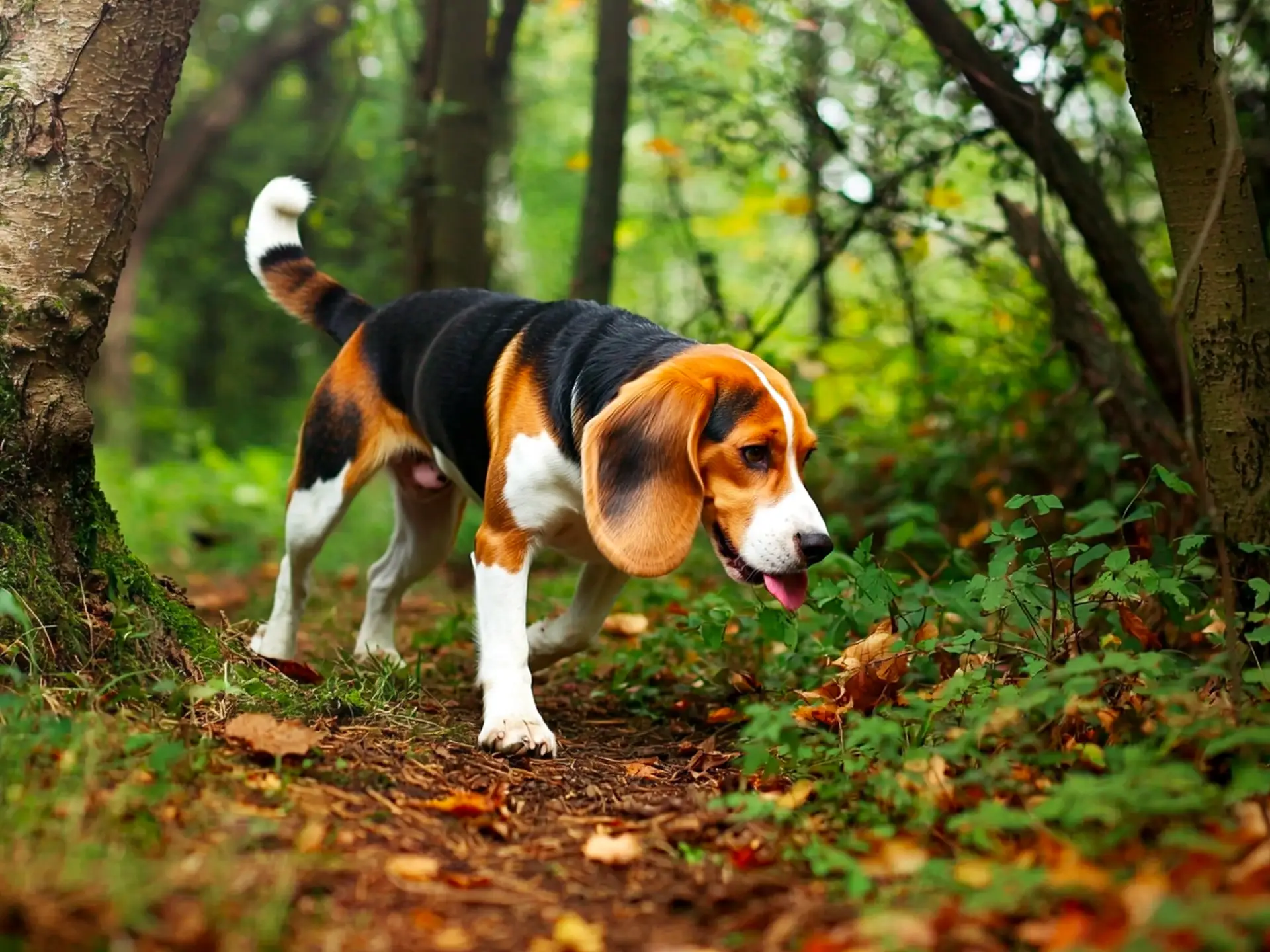Beagle Dog Breed Info & Overview
Ever wondered why Beagles are such a beloved breed? With their friendly disposition, curious nature, and those irresistible floppy ears, Beagles make fantastic companions for families and individuals alike. Originating as hunting dogs, they bring energy and enthusiasm to every activity. Their compact size and sociable personality make them adaptable to various living situations, from apartments to country homes.
Characteristics
Pictures
Breed History
The Beagle’s history dates back to ancient Greece, but the breed as we know it was developed in England around the 1830s. Originally bred for hunting hare, Beagles were prized for their incredible sense of smell and stamina. Their name is thought to derive from the Old French word “be’geule,” referring to their baying voice.
These small hounds became favorites among English hunters who needed a dog that could navigate rough terrain while tracking scents. Beagles were often kept in packs and were known for their ability to work collaboratively during hunts. Their popularity spread, and they were brought to the United States, where they continued to excel as hunting companions.
Over time, Beagles transitioned from hunting fields to family homes, thanks to their affectionate and gentle nature. They have maintained their keen noses and are still used in some areas for tracking and detection work. Today, they are among the most popular breeds worldwide, cherished for both their working abilities and companionship.
Temperament, Personality
Friendly and outgoing, Beagles are known for their merry personalities. They thrive on companionship and are happiest when included in family activities. Their playful nature makes them excellent playmates for children, and they are generally tolerant and patient.
Beagles usually get along well with other dogs, especially if socialized early. However, their hunting instincts mean they may be inclined to chase smaller animals, so introductions to cats and other small pets should be managed carefully. They are not typically aggressive but may be a bit reserved with strangers at first.
These hounds are curious and love to explore, often following their noses wherever a scent takes them. This can lead to mischief if they are left unattended. Beagles require mental stimulation and physical activity to keep them engaged and prevent boredom-related behaviors.
Physical Characteristics
Beagles are small to medium-sized dogs with a sturdy build. They typically stand between 13 and 15 inches (33–38 cm) tall and weigh around 20 to 30 pounds (9–14 kg). Their compact size makes them manageable for most households, yet they are solid and athletic.
One of the most distinctive features of the Beagle is their expressive brown or hazel eyes, which give them a soulful appearance. Their ears are long and floppy, set low on their broad head, contributing to their endearing look. They have a strong, straight muzzle and a black nose that’s highly sensitive to scents.
The Beagle’s coat is short and dense, designed to protect them during hunts in various weather conditions. Common coat colors include tricolor (black, tan, and white), red and white, and lemon and white. Their tails are carried high but not curled over the back, often tipped with white, which historically helped hunters spot them in tall grass.
Health Issues
Beagles are generally healthy dogs but can be prone to certain genetic health issues. Common concerns include hip dysplasia, epilepsy, and hypothyroidism. Ear infections are also frequent due to their floppy ears, which can trap moisture and debris.
Regular veterinary check-ups are essential to detect and manage health problems early. Maintaining a healthy weight through proper diet and exercise can prevent obesity-related issues, which Beagles are susceptible to due to their hearty appetites.
Responsible breeders screen for genetic conditions to reduce the likelihood of inherited diseases. Owners should clean their Beagle’s ears regularly and monitor for signs of infection. Dental hygiene is also important, as small breeds can be prone to dental issues.
Grooming Needs
Beagles have low to moderate grooming needs thanks to their short, smooth coats. Weekly brushing with a bristle brush or grooming mitt helps remove loose hair and distribute skin oils, keeping their coat healthy and shiny. They do shed moderately, so regular brushing can help control shedding.
Bathing a Beagle is necessary only when they become dirty or have rolled in something unpleasant, which they are known to do given their love for interesting scents. Use a gentle dog shampoo to avoid skin irritation. Be sure to rinse thoroughly to prevent residue that can cause itching.
Due to their floppy ears, Beagles require regular ear checks and cleaning to prevent infections. Nails should be trimmed monthly if they don’t wear down naturally. Dental care is important, so brushing their teeth several times a week is recommended to prevent tartar buildup and gum disease.
Exercise Requirements
Beagles are energetic dogs that need at least an hour of exercise each day. This can include walks, playtime in a securely fenced yard, or interactive games. Their strong scenting ability means they enjoy activities that engage their nose, like tracking games or scent trails.
Without sufficient exercise, Beagles may become bored and develop destructive behaviors such as chewing or digging. They benefit from mental stimulation as much as physical activity, so puzzle toys and training sessions can help keep their minds sharp.
Be cautious when exercising your Beagle off-leash, as their nose can lead them astray. They might pick up a scent and wander off, ignoring recall commands. Using a leash or ensuring the area is securely fenced is essential for their safety during outdoor activities.
Training Tips
Training a Beagle can be both rewarding and challenging due to their independent and sometimes stubborn nature. They are intelligent but can be easily distracted by scents. Using positive reinforcement techniques, such as treats and praise, works best to motivate them.
Consistency is key when training a Beagle. Short, engaging sessions will hold their attention better than long, repetitive ones. Incorporating scent-based games can make training more enjoyable for them and capitalize on their natural instincts.
Early socialization and obedience training are important to help Beagles become well-mannered adults. Enrolling in puppy classes can provide structured learning and opportunities to interact with other dogs and people, which enhances their social skills.
Nutrition, Diet
Beagles have a hearty appetite and can be prone to overeating, so it’s important to monitor their food intake closely. Feeding them high-quality dog food formulated for small to medium breeds with moderate energy levels is recommended. Typically, an adult Beagle requires about ¾ to 1.5 cups of dry food per day, divided into two meals.
Because Beagles are active, their diet should provide sufficient protein to support muscle development and maintenance. Look for foods with real meat as the first ingredient. Omega-3 fatty acids can help maintain a healthy coat and skin, which is beneficial for this breed.
Treats should be given sparingly to prevent weight gain. Beagles are food-motivated, which is helpful in training, but overindulgence can lead to obesity. Measuring their food and sticking to a regular feeding schedule can help maintain a healthy weight. Always ensure fresh water is available.
Adoption, Breeders
If you’re interested in adding a Beagle to your family, consider reaching out to breed-specific rescue organizations. These groups specialize in rehoming Beagles in need of a loving home. The Beagle Rescue Foundation is a great place to start your search.
When choosing a breeder, ensure they are reputable and prioritize the health and temperament of their dogs. Visit the breeder’s facility to see how the puppies are raised and ask for health clearances for both parents. The National BeagleClub of America provides a directory of responsible breeders.
Avoid purchasing from pet stores or online sellers who cannot provide detailed information about the puppy’s lineage and health. Ethical breeders and rescues will be happy to answer your questions and help you determine if a Beagle is the right fit for your lifestyle.
Family Pet?
Beagles make wonderful family pets due to their affectionate and friendly nature. They are known for being excellent with children, enjoying playtime and cuddles alike. Their small size and gentle demeanor make them suitable companions for kids of all ages.
These dogs are social animals that generally get along well with other dogs. Early socialization can enhance their ability to interact positively with other pets in the household. However, their hunting instincts may make them inclined to chase smaller animals, so introductions to cats or small pets should be supervised.
Beagles thrive in environments where they are included in family activities. They do not like being left alone for long periods and may develop separation anxiety. Families that can provide time, attention, and exercise will find the Beagle to be a loyal and joyful addition.
Right For You?
If you’re an active individual or family looking for a playful and affectionate companion, the Beagle might be the perfect match. They require daily exercise and enjoy engaging activities, making them ideal for those who like spending time outdoors.
Beagles do best in homes where they are not left alone frequently, as they crave companionship. Apartment living is possible if their exercise needs are met, but a house with a securely fenced yard is ideal to give them space to explore safely.
Potential owners should be prepared for training challenges due to the breed’s independent streak. Patience and consistent positive reinforcement are necessary. If you’re willing to invest time in their training and provide a loving environment, a Beagle can bring endless joy to your life.
Conclusion
Beagles are charming, energetic dogs that can make a delightful addition to the right home. Their friendly disposition and love for family make them wonderful companions, especially for active households. While they require regular exercise and can present training challenges due to their strong sense of smell and independent nature, the rewards of owning a Beagle are plentiful. With proper care, attention, and a bit of patience, these merry hounds will fill your life with laughter and affection. If you’re seeking a loyal friend who’s always up for an adventure, the Beagle might just be the perfect breed for you.
FAQs
-
Are Beagles good apartment dogs?
Beagles can adapt to apartment living if they receive enough daily exercise and mental stimulation. However, their tendency to bark and howl may be challenging in close living quarters, so training and keeping them engaged is essential.
-
Do Beagles have a strong sense of smell?
Yes, Beagles have one of the most powerful senses of smell among dog breeds. Their noses have about 220 million scent receptors, making them excellent scent hounds used in detection work and hunting.
-
How much do Beagles bark?
Beagles are vocal dogs and are known for their distinctive baying bark. They may bark or howl when excited, bored, or following a scent. Training can help manage excessive barking behaviors.
-
Can Beagles be left alone for long periods?
Beagles are social dogs and don’t do well when left alone for extended periods. They can develop separation anxiety or engage in destructive behaviors. It’s best to keep them company or hire a dog sitter.
-
Do Beagles need a lot of mental stimulation?
Yes, Beagles thrive with mental challenges. Puzzle toys, scent games, and regular training sessions are great for keeping their intelligent minds engaged, preventing boredom-related behaviors.
Breed Ratings
Beagles are smart but can be stubborn. They have a strong scent drive that can make training a bit challenging at times.
Beagles are extremely playful and love to engage in games with their families, making them great companions for children.
These dogs have high energy and need regular physical activity to keep them content and prevent boredom.
Beagles shed moderately year-round, with more noticeable shedding during seasonal changes, requiring regular brushing.
With a strong hunting background, Beagles have a high prey drive and may chase small animals if not properly managed.
Their short coat is easy to maintain with weekly brushing, making grooming relatively simple compared to other breeds.
Beagles can be stubborn and easily distracted, requiring patience and consistent positive reinforcement during training.
They prefer company and may experience separation anxiety if left alone for extended periods, leading to undesirable behaviors.
Beagles are vocal and known for their distinctive bark and howl, which can be frequent without proper training.
Beagles are not excessive droolers, so owners rarely have to deal with slobber compared to some other breeds.
Generally sociable, Beagles usually get along well with other dogs, especially when socialized from a young age.
Beagles are typically healthy, but like all breeds, they can be prone to certain genetic health conditions that require monitoring.




















